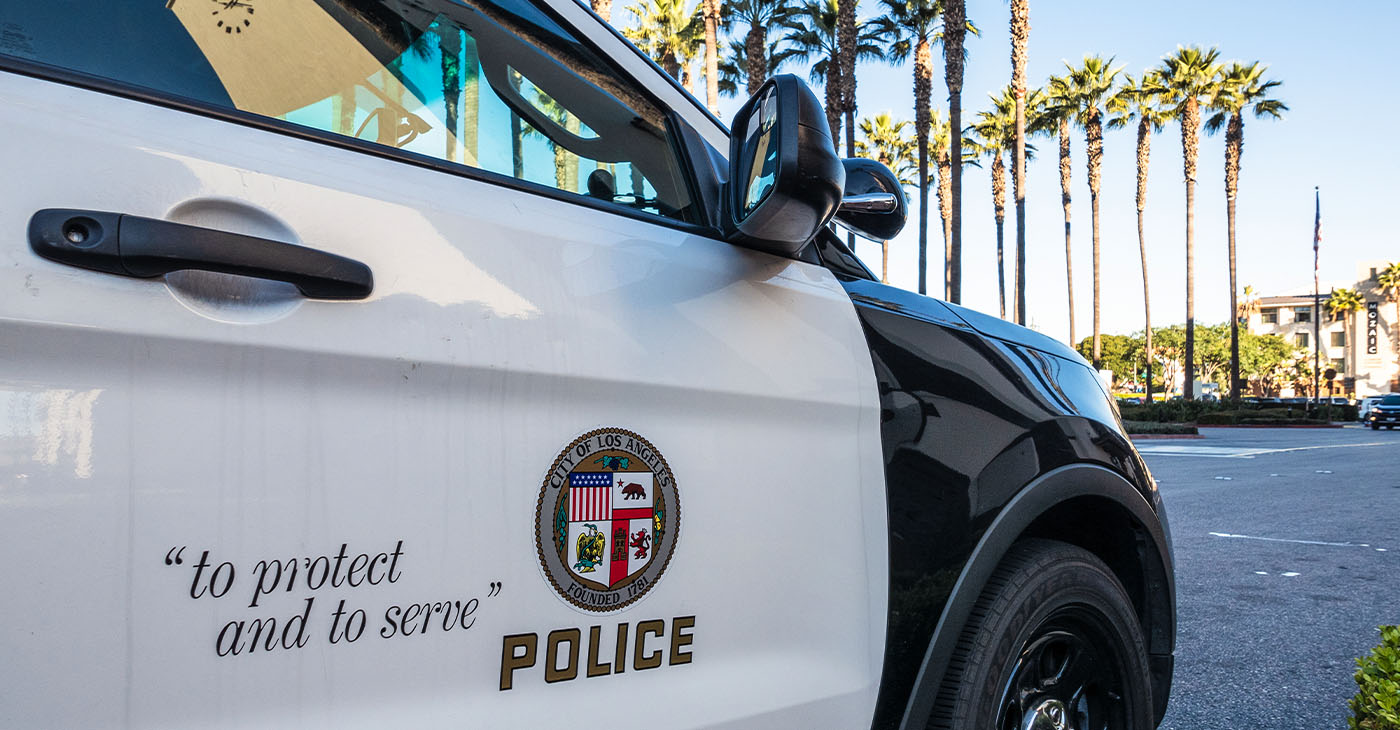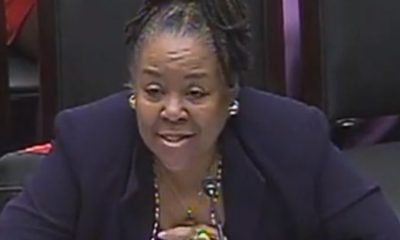Bay Area
Report Reveals California Cops Explicit Bias against African Americans
While the data show that most people consent to a search when asked by an officer, research from the report reflects that this “consent” is not necessarily voluntary because of the inherent power inequality between a law enforcement officer and a member of the public.

By Stacy M. Brown | NNPA Newswire
A new report has revealed that California law enforcement officers searched, detained on the curb or in a patrol car, handcuffed, and removed from vehicles more individuals perceived as Black than individuals perceived as white, even though they stopped more than double the number of individuals perceived as white than individuals perceived as Black.
California’s Racial and Identity Profiling Advisory Board’s report gathered information from 18 law enforcement agencies.
The data revealed that officers stopped 2.9 million individuals in 2020. Most were African Americans and members of the LGBTQ community.
The agency said that the data included what officers “perceived” to be the race, ethnicity, gender, and disability status of people they stopped, even if the perception was different from how the person identified.
According to the data, authorities search African Americans 2.4 times more than whites and disproportionately more than other racial and ethnic groups.
It also found that individuals officers perceived as transgender women were 2.5 times more likely to be searched than women who appeared cisgender.
Data for the report came from the state’s most important law enforcement agencies, like the California Highway Patrol.
However, the highway patrol didn’t include data analyzing stops based on gender identity.
All agencies must report the data in 2023.
“The data in this report will be used by our profession to evaluate our practices as we continue to strive for police services that are aligned with our communities’ expectations of service,” Chief David Swing, co-chair of the Board and past president of the California Police Chiefs Association, said in a statement.
The report further showed that Black and Hispanic individuals were more likely to have force used against them compared to white individuals, while Asian and other individuals were less likely.
Specifically, the odds of having force used during a stop were 1.32 times and 1.16 times as high for Black and Hispanic individuals, respectively.
Asian and other individuals whom officers stopped had lower odds of having force used against them (0.80 and 0.82, respectively) relative to the odds for those perceived as white.
Search discovery rate analyses showed that, when officers searched individuals, all races, or ethnic groups of color, except for Asian and Middle Eastern/South Asian individuals, had higher search rates despite having lower rates of discovering contraband than individuals perceived as white.
Furthermore, a search and discovery rate analysis show that officers searched people perceived to have a mental health disability 4.8 times more often and people perceived to have other types of disabilities 2.7 times more often than people perceived to have no disability.
Still, they discovered contraband or evidence at a lower rate during stops and searches of people with disabilities.
Officers used force against individuals perceived to have mental health disabilities at 5.2 times the rate at which they used force against individuals they perceived to have no disabilities.
The data show that Black and Hispanic/Latinx individuals are asked for consent to search at higher rates than white individuals.
Officers searched Black, Hispanic/Latinx, and multiracial individuals at higher rates for consent-only searches than all other racial/ethnic groups.
These consent-only searches resulted in lower rates of discovery of contraband (8.5%, 11.3%, and 13.0%, respectively) than searches of all other racial and ethnic groups.
The reason for the stop was a traffic violation in more than half of the stops where officers conducted a consent-only search (consent being the only reason for the search) of Black, Hispanic/Latinx, and Middle Eastern/South Asian individuals.
On the other hand, less than 30% of the consent-only searches of white people happened during traffic stops.
The people who wrote the report said that searches based on consent alone lead to fewer discoveries than searches based on reasonable suspicion or probable cause.
With consent-only searches, the rate of finding something was 9.2 percentage points lower for Black people than for white people.
“Given the disparities in the data on consent searches, the board questions whether consent searches are truly voluntary,” the authors wrote.
While the data show that most people consent to a search when asked by an officer, research from the report reflects that this “consent” is not necessarily voluntary because of the inherent power inequality between a law enforcement officer and a member of the public.
The research shows that this natural power imbalance is evident in vulnerable groups, such as people with mental health problems or young people, who may be more likely to give in to authority.
“Indeed,” the authors wrote, “RIPA data reflects that for both people with mental health disabilities and youth, a larger proportion of their stops that began as consensual encounters resulted in searches, as compared to people without mental health disabilities or adults.”
Board members said they carefully looked at the data about people who were stopped and searched because of their status as people under supervision.
The Board’s analyses reveal significant disparities that warrant further examination of law enforcement practices.
For example, officers performed supervision-only searches – where supervision status is the only basis for the search – of individuals perceived as Black at 2.8 times the rate at which they performed supervision-only searches of individuals they perceived as white.
Similarly, officers also performed supervision plus searches – where the officer had some other basis to search the person – of Black individuals at 3.3 times the rate they performed supervision plus searches of white individuals.
The rates of discovering contraband for supervision-only searches were lower for all racial/ethnic groups than white individuals; Black individuals had the most considerable difference in their discovery rate (-11.4 percentage points) compared to whites.
Officers also reported a higher proportion of supervision-only searches during stops for traffic violations (46.9%) than during reasonable suspicion stops (24.6%).
“These were just a few of the many disparities discussed in the report,” board members noted.
“Given the large disparities observed, the Board reviewed efforts by various law enforcement agencies to limit inquiries into supervision status as well as stops and searches on the basis of supervision status.
“The RIPA data further indicates that the practice of conducting supervision-only searches shows racial disparities that result in low yield rates of contraband or evidence.”
Activism
Oakland Post: Week of April 24 – 30, 2024
The printed Weekly Edition of the Oakland Post: Week of April 24 – 30, 2024

To enlarge your view of this issue, use the slider, magnifying glass icon or full page icon in the lower right corner of the browser window. ![]()
Alameda County
DA Pamela Price Stands by Mom Who Lost Son to Gun Violence in Oakland
Last week, The Post published a photo showing Alameda County District Attorney Pamela Price with Carol Jones, whose son, Patrick DeMarco Scott, was gunned down by an unknown assailant in 2018.

Publisher’s note: Last week, The Post published a photo showing Alameda County District Attorney Pamela Price with Carol Jones, whose son, Patrick DeMarco Scott, was gunned down by an unknown assailant in 2018. The photo was too small for readers to see where the women were and what they were doing. Here we show Price and Jones as they complete a walk in memory of Scott. For more information and to contribute, please contact Carol Jones at 510-978-5517 at morefoundation.help@gmail.com. Courtesy photo.
Bay Area
State Controller Malia Cohen Keynote Speaker at S.F. Wealth Conference
California State Controller Malia Cohen delivered the keynote speech to over 50 business women at the Black Wealth Brunch held on March 28 at the War Memorial and Performing Arts Center at 301 Van Ness Ave. in San Francisco. The Enterprising Women Networking SF Chapter of the American Business Women’s Association (ABWA) hosted the Green Room event to launch its platform designed to close the racial wealth gap in Black and Brown communities.

By Carla Thomas
California State Controller Malia Cohen delivered the keynote speech to over 50 business women at the Black Wealth Brunch held on March 28 at the War Memorial and Performing Arts Center at 301 Van Ness Ave. in San Francisco.
The Enterprising Women Networking SF Chapter of the American Business Women’s Association (ABWA) hosted the Green Room event to launch its platform designed to close the racial wealth gap in Black and Brown communities.
“Our goal is to educate Black and Brown families in the masses about financial wellness, wealth building, and how to protect and preserve wealth,” said ABWA San Francisco Chapter President LaRonda Smith.
ABWA’s mission is to bring together businesswomen of diverse occupations and provide opportunities for them to help themselves and others grow personally and professionally through leadership, education, networking support, and national recognition.
“This day is about recognizing influential women, hearing from an accomplished woman as our keynote speaker and allowing women to come together as powerful people,” said ABWA SF Chapter Vice President Velma Landers.
More than 60 attendees dined on the culinary delights of Chef Sharon Lee of The Spot catering, which included a full soul food brunch of skewered shrimp, chicken, blackened salmon, and mac and cheese.
Cohen discussed the many economic disparities women and people of color face. From pay equity to financial literacy, Cohen shared not only statistics, but was excited about a new solution in motion which entailed partnering with Californians for Financial Education.
“I want everyone to reach their full potential,” she said. “Just a few weeks ago in Sacramento, I partnered with an organization, Californians for Financial Education.
“We gathered 990 signatures and submitted it to the [California] Secretary of State to get an initiative on the ballot that guarantees personal finance courses for every public school kid in the state of California.
“Every California student deserves an equal opportunity to learn about filing taxes, interest rates, budgets, and understanding the impact of credit scores. The way we begin to do that is to teach it,” Cohen said.
By equipping students with information, Cohen hopes to close the financial wealth gap, and give everyone an opportunity to reach their full financial potential. “They have to first be equipped with the information and education is the key. Then all we need are opportunities to step into spaces and places of power.”
Cohen went on to share that in her own upbringing, she was not guided on financial principles that could jump start her finances. “Communities of color don’t have the same information and I don’t know about you, but I did not grow up listening to my parents discussing their assets, their investments, and diversifying their portfolio. This is the kind of nomenclature and language we are trying to introduce to our future generations so we can pivot from a life of poverty so we can pivot away and never return to poverty.”
Cohen urged audience members to pass the initiative on the November 2024 ballot.
“When we come together as women, uplift women, and support women, we all win. By networking and learning together, we can continue to build generational wealth,” said Landers. “Passing a powerful initiative will ensure the next generation of California students will be empowered to make more informed financial decisions, decisions that will last them a lifetime.”
-

 Activism4 weeks ago
Activism4 weeks agoOakland Post: Week of March 27 – April 2, 2024
-

 #NNPA BlackPress4 weeks ago
#NNPA BlackPress4 weeks agoBeloved Actor and Activist Louis Cameron Gossett Jr. Dies at 87
-

 Community1 week ago
Community1 week agoFinancial Assistance Bill for Descendants of Enslaved Persons to Help Them Purchase, Own, or Maintain a Home
-

 Activism3 weeks ago
Activism3 weeks agoOakland Post: Week of April 3 – 6, 2024
-

 Business2 weeks ago
Business2 weeks agoV.P. Kamala Harris: Americans With Criminal Records Will Soon Be Eligible for SBA Loans
-

 Activism2 weeks ago
Activism2 weeks agoOakland Post: Week of April 10 – 16, 2024
-

 Community2 weeks ago
Community2 weeks agoAG Bonta Says Oakland School Leaders Should Comply with State Laws to Avoid ‘Disparate Harm’ When Closing or Merging Schools
-

 Community1 week ago
Community1 week agoOakland WNBA Player to be Inducted Into Hall of Fame






















































